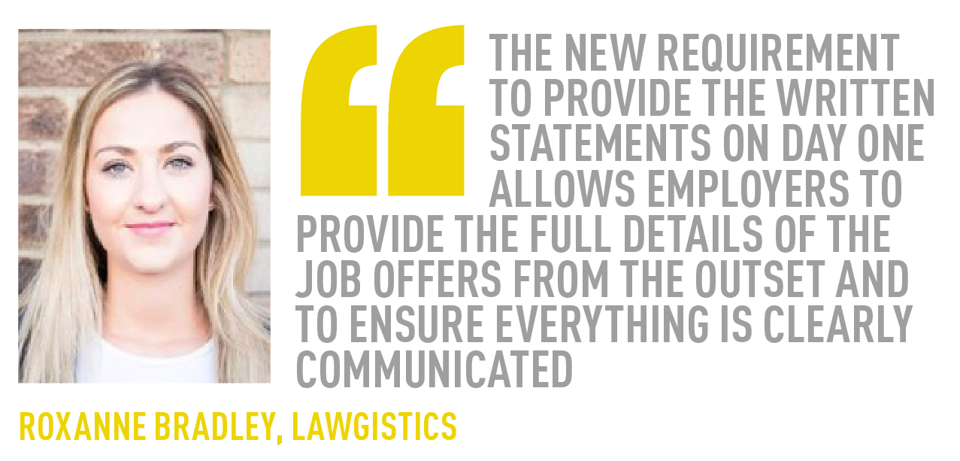HR managers need to update employment processes before two new pieces of legislation come into force on April 6, 2020.
The Employment Rights (Miscellaneous Amendments) Regulations 2019 allows for all workers to receive a written statement of employment particulars (including casual workers) and the Employment Rights (Employment Particulars and Paid Annual Leave) (Amendment) Regulations 2018 requires the particulars to be issued on the first day of the employment.
The big change will be the issue of the written statement of particulars. Employees must receive a letter of particulars with extended content requirements on the first day of taking up their post, compared with the current deadline of within two months of starting.
Roxanne Bradley, legal adviser at Lawgistics, said: “The new requirement to provide the written statements on day one allows employers to provide the full details of the job offers from the outset and to ensure everything is clearly communicated.
“It may not yet have come into force, but employers should be getting ready. Start by reviewing the current contract in place, ensure there is a system in place for when any new employee starts the company (certainly from April 2020), be prepared for if/when existing members of employees request a new statement, review any employee/worker status issues and ensure the contracts reflect the new requirements, which can be provided from the employee’s/worker’s start date.”
Currently, the written statement includes information such as the name of the employee and employer, the date when the employment began, the scale or rate of pay, hours of work, holiday entitlement, sick leave and pay, and pension schemes. Enhanced content will incorporate details such as days of the week to be worked, terms relating to paid leave such as maternity leave, benefits such as private medical care or bonuses, details of any probationary period and training entitlements, as well as any training the employee will be required to complete.
Bradley added: “It is also worth highlighting, if an existing employee has not requested a written statement of particulars after the April 6 2020, but there is a change within the company, employers will have to notify the existing employees of such change.”
Graham Jones, director of legal services at Lawdata, points out that although details of sick pay, pension arrangements and training entitlement can be provided separately, all the information must be provided, not simply made available for reference.
The Working Time regulation has also been amended so that the calculation of a week’s pay is to be based on a 52-week average. If the worker has not been employed for 52 full weeks, it’s based on the number of complete weeks of employment.
In arriving at the average weekly remuneration, no account is taken of a week in which no remuneration was payable and remuneration in earlier weeks shall be brought in so as to bring it up to 52, which can favour the automotive retail sector.
Jones said: “The current position is that it’s based on a 12-week average, which can mean that a sales executive would get more holiday pay for a week off following three busy months, rather than for a week off after three quieter months, so this change helps deal with seasonal fluctuations.”
The repercussions for employer transgressions can be extensive, although Jones thinks outcomes such as these will be rare and would usually only apply where the action was deliberate or committed with malice, or where the employer had repeatedly breached the employment right concerned.





















Login to comment
Comments
No comments have been made yet.